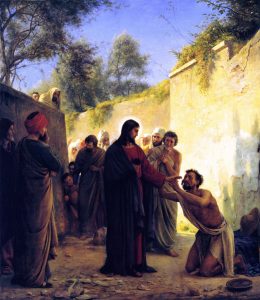Then Jesus said,
“I came into this world for judgment,
so that those who do not see might see,
and those who do see might become blind.”Some of the Pharisees who were with him heard this
and said to him, “Surely we are not also blind, are we?”
Jesus said to them,
“If you were blind, you would have no sin;
but now you are saying, ‘We see,’ so your sin remains.”—John 9:39–41
 We all have blind spots in our lives: things that we fail to see, sins that we fail to recognize, blessings that we fail to notice. When our lives begin to fall into certain patterns and routines, our perspective can sometimes become limited within the realm of those habits, and we forget that there are other things that need our attention as well. Maybe there are weaknesses we need to work on, situations where we need to take more initiative, or areas where we should be more charitable. Every so often, we need to assess our blind spots. This requires us to make ourselves uncomfortable, to turn around and take a look at the places that are difficult to see instead of just cruising along and glancing at the rearview mirror. But in order to keep moving forward, we have to stay aware of our surroundings; we have to take responsibility in all areas of our lives. We have to acknowledge that we can’t see the whole picture from where we’re standing, and ask for God’s help to reveal the things we can’t see on our own.
We all have blind spots in our lives: things that we fail to see, sins that we fail to recognize, blessings that we fail to notice. When our lives begin to fall into certain patterns and routines, our perspective can sometimes become limited within the realm of those habits, and we forget that there are other things that need our attention as well. Maybe there are weaknesses we need to work on, situations where we need to take more initiative, or areas where we should be more charitable. Every so often, we need to assess our blind spots. This requires us to make ourselves uncomfortable, to turn around and take a look at the places that are difficult to see instead of just cruising along and glancing at the rearview mirror. But in order to keep moving forward, we have to stay aware of our surroundings; we have to take responsibility in all areas of our lives. We have to acknowledge that we can’t see the whole picture from where we’re standing, and ask for God’s help to reveal the things we can’t see on our own.
Jesus is able to heal the humble, unpretentious blind man. He restores his sight and, in His mercy, covers the man’s deficiencies. Many people wonder whether this man was truly blind to begin with, and he tells them, simply and powerfully: “I was blind and now I see.” Jesus is unable, however, to heal the spiritually blind Pharisees who refuse to even acknowledge their blindness, let alone ask Jesus for help. Jesus shows us time and again in the Gospels that He is merciful and tenderhearted toward those in need, but He doesn’t force Himself upon us if we don’t welcome Him in. He answers our pleas when we acknowledge our weaknesses and ask for healing.
Through the healing of the blind man, Jesus also reveals that, in contrary to the understanding of the Jews at that time, suffering is not just a punishment for sin. Everyone had assumed that the man was blind due to either his sin or the sins of his parents; from an Old Testament perspective, physical ailments and disabilities were seen as a direct result of prior sinfulness. But Jesus’s sacrifice turns this perspective upside down. Because He shared in our suffering and would redeem it on the Cross, the sufferings we experience in our own lives are no longer punishments but gifts. They are opportunities to share in His glory through the Cross. He didn’t get rid of suffering in the world, but He gave it deeper meaning. So we don’t need to hide our weaknesses and pretend, out of pridefulness, that we can see clearly when we can’t—because our blind spots aren’t necessarily anything to be ashamed of; they are part of our human condition. We are dependent on God to illuminate the darkness, and He intends for us to need Him in that way. When we experience trials, we can take heart in Jesus’s words:
Neither he nor his parents sinned;
it is so that the works of God might be made visible through him.
We have to do the works of the one who sent me while it is day.Night is coming when no one can work.
While I am in the world, I am the light of the world.—John 9:3–5
Jesus warns us that we will have to endure periods of blindness and times of suffering, but He also tells us that these will occur so that the works of God might be made visible through our blindness. And that happens when we place ourselves before Him for healing, asking God to work in us and open our eyes to truly see.
—
Image: Carl Bloch, Healing of the Blind Man / PD-US






2 thoughts on “Blind Spots”
The Hopi Indians are very skillful weavers with a tradition of inserting an imperfection or mistake into their creations to acknowledge that they are not perfect. The story of the man born blind has another meaning and a cornerstone of a better understanding about our understanding of God’s expansiveness compared to our own minimalism when it comes to revealed dogma. When Jesus was asked about the man born blind He understood the implications of revealing too much too soon to a people who were struggling with the new commandment to Love on another. He lived at a time when it was forbidden to talk with women, have more than one wife and stone people to death. He was not going to delve into advanced theology on these post iron age folks and so used a brilliant diversion to make a point without confusing their understanding – sort of like what Francis has done with AL. When asked, Jesus used the singular pronoun to make the exception clear. THIS MAN (not all men) is to show the glory of God. The question was left for another time, our time, when St JPII sat down with the Dali Lama to talk common theology and Francis dropping in to greet Buddhist monks. A 100 years ago this would have caused a scandal of the highest order as all Catholics were forbidden to enter other houses of worship and ONLY Catholics went to heaven. I enjoyed your piece very much esp the insight that suffering is a gift.
Glad you enjoyed it, James! You have some great insights.